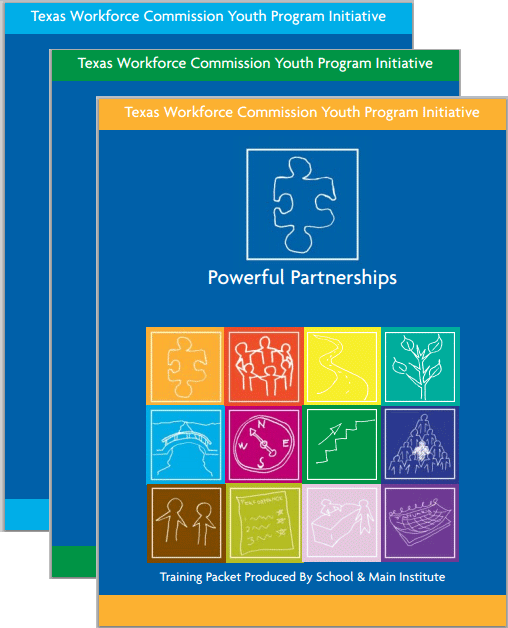Tools & Publications
Here are some of the tools we've developed as part of our work. Feel free to download and use them for personal, educational or noncommercial use only. If in doubt about fair use, please contact us for permission (we're happy to share, but would want to know more about your plans).
Reimagining Juvenile Justice Curriculum Online
School & Main Institute (SMI) is pleased to announce the release of their Reimagining Juvenile Justice (RJJ) curriculum in a new eLearning format. The eLearning course modules are readily available by clicking the SMI Toolbox. Sponsored by the Annie E. Casey Foundation and designed by SMI and their partners at Wheelock College of Education at Boston University, RJJ is a professional development initiative targeted to practitioners and organizations working with youth and families involved in the juvenile justice system. Built upon the core elements of positive youth development, RJJ aims to help staff better support, divert and redirect youth to appropriate and fair justice options. Training is based on adolescent development research that shows youth thrive in a positive environment with the support of caring adults.
Piloted in Massachusetts in 2016 and replicated in Pima County., Arizona in 2018, SMI with the support of their partners at the Casey Foundation, continues to expand the RJJ footprint with a growing cadre of certified RJJ trainers. The curriculum has been informed by the pilot of the model and the experiences and approaches developed by many of trainers who have delivered the curriculum locally and by young people who have been directly impacted by the juvenile justice system.
The RJJ curriculum consists of six (6) core modules along with an Introduction. Each module is briefly described below with a link to access the eLearning. Available as a standalone course of study for independent learners, RJJ is also available as a facilitated professional development opportunity delivered by experienced trainers. In spring 2022, SMI launched a powerful RJJ Training Series in Arkansas targeting new and incumbent juvenile probation officers. In 2023, SMI will once again offer an RJJ Training-for-Trainers Institute for those wishing to become certified RJJ trainers.
RJJ Course of Study & eLearning Links
Reimagining Juvenile Justice: Introduction: The history, approach and “why” of RJJ along with an overview of the evolution and expansion of the work across the country.
Module 1: Positive Youth Development: Learn the basic core concepts of positive youth development and its application in the juvenile justice arena. Understand the fundamental interconnections between adolescent brain development and positive youth development. Recognize the developmental assets necessary for a youth’s healthy growth and explore new ideas and strategies for how to integrate positive youth development principles into practice.
Module 2: Racial and Ethnic Equity and Inclusion: Challenge and change institutional and structural racism in our youth-serving systems, including dismantling a deficit mindset that skews how decision makers think of youth of color by focusing on their problems rather than potential. Learn to replace this mindset with a framework based on positive youth development. With a diverse stakeholder collaborative, explore strategies for eliminating policies and practices that have a disparate effect on youth of color.
Module 3: Engaging Authentic Youth Voice & Empowering Youth Leadership: Youth have the right, responsibility, and power to be architects of their life-goal planning and decision making. Participants will gain a better understanding of how to build healthy and productive relationships with youth and both identify and advocate for opportunities to help youth thrive and create their own individual pathway to success.
Module 4: Fostering Positive Family Relationships: Establishing positive, authentic and trusting relationships with the parents and families of youth in the justice system is essential to helping youth participate in and transition successfully from placements into positive community life. Although there is no one-size-fits-all method for establishing such relationships, professionals can help strengthen family and community ties that recognize and promote their role in the development of youth plans.
Module 5: Utilizing a Cross-System Approach to Youth Services: Understand the nature of collaboration and the basic steps and stages of building cross-sector relationships. Learn ways to identify, access, navigate and leverage the diverse youth-serving systems, opportunities and resources that exist in the community. Recognize that divergent views and relationships often existing between and across youth-serving professionals and systems can be negotiated by addressing mutual self-interest and by being accountable to shared goals and a common vision of results.
Module 6: Transforming Policies and Practice: To ensure that REEI-informed positive youth development and cross-system strategies become the prevailing framework for juvenile justice systems seeking lasting reform, policies and practices need to be reexamined, refined, often changed, then systematized into a new way of doing business. Recommendations for these changes will be made to leadership within the jurisdiction for action.
To date, 16 states, 35 jurisdictions and over 800+ professionals have been trained in RJJ with a new cadre of 53 trainers representing 11 sites from around the country coming on board this fall. Click here to learn about the RJJ story in Ohio and impact on their state’s youth justice system reform efforts.
The RJJ curriculum is a living resource and will continue to be updated with new resources and emerging concepts. For more information on RJJ opportunities, please contact Kathy Flynn Woodland at katflynn@schoolandmain.org.
Making Education and Career Pathways Work for Justice-Involved Youth
For youth with justice involvement, the path away from the system often isn’t straightforward or linear. It takes tighter cross-system relationships, well-prepared staff, and creative personalized program services to provide the support these young people need to achieve longer-term educational and career pathway goals. LEAP youth are showing that longer-term pathway goals are within reach when systems work together. This LEAP Learning Brief, developed as part of SMI's work with The Annie E. Casey Foundation, JFF, and Jobs for America's Graduates highlights effective strategies and lessons learned by 10 local LEAP partnerships around the country serving justice-involed youth. Click here to read this Learning Brief. Two other LEAP Learning Briefs written by JFF and MDRC are also available the Casey Foundation website.
Massachusetts Department of Elementary and Secondary Education Wraparound Replication Cookbook
Rethink how you do student support! This cookbook is the result of the Massachusetts Wraparound Zone Initiative - it's the handbook people involved in the project wish they’d had when they first started and the one they were able to write after four years of deep and thoughtful work. Click here to view the Wraparound Cookbook.
Youth Program Training Guides
Developed as part of a 3-year initiative with 28 Texas Workforce Boards, these guides cover many youth and partnership development elements. They include "Food for Thought" to help frame your work, as well as "Tools for Action" -- activities and materials you can use in training and strategic planning sessions. Call us if you need additional help.

- Powerful Partnerships
- Getting Your Youth Advisory Group from Here to There
- You and Youth in the Middle: Effective Case Management
- Employer Engagement
- Youth at Work: Making the Most of Work-Based Learning
- Youth Investment in Rural Areas
- Windows on the Workplace: Mentoring, Youth, and WIA
- Community Resource Mapping: Knowing Your Youth Services Landscape
- Letting the Numbers Guide: Labor Market Information and Youth Services
- Engaging Out-of-School Youth
- Building Your Year-Round Youth System
- Evaluate It! Performance and Your Youth System
Other Resources
Our colleagues at the National Alliance on Mental Health created an in-depth manual for creating Crisis Intervention Teams (CITs) for Youth which incorporates SMI's work on community mapping and other helpful strategies for making sure that youth with mental health needs receive the services and support they need. Visit NAMI to learn more.




 Login
Login